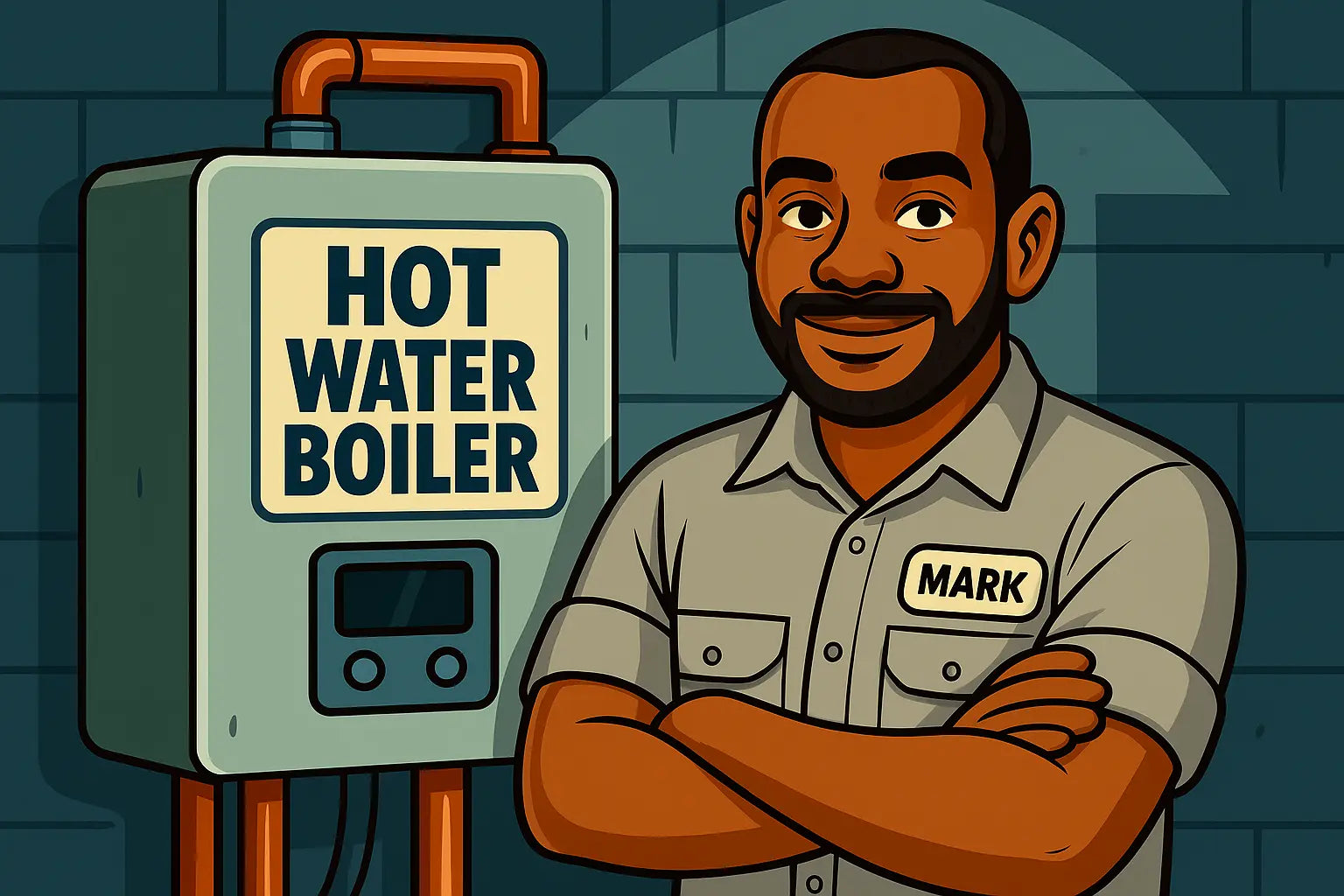Hey there, Mark here 👋.
If you’ve ever stood in front of your old boiler during a winter cold snap, wondering if it’s time to make a change—this post is for you. And if you’re wrestling with the age-old question of oil vs. gas, buckle up. I’m laying it all out, straight-shooter style.
First Things First: What’s the Big Difference?
Let’s break it down real simple:
-
Oil boilers burn heating oil stored in a tank on your property.
-
Gas boilers connect to a natural gas line and burn cleaner, with no need for on-site fuel storage.
Both heat water or steam that moves through your radiators or radiant floors—but the way they operate (and what they cost) can be wildly different.
🔍 Efficiency and Performance: Which Gets You More Heat for Less?
Gas boilers tend to come out ahead in the efficiency game—but only if you’ve got the right hookup.
-
Natural gas burns cleaner, and modern gas condensing boilers can hit efficiency ratings above 95% AFUE.
-
Oil boilers, on the other hand, max out around 87%–90% AFUE, and you’ll need to keep that oil tank topped up.
According to the U.S. Department of Energy, replacing an old, inefficient boiler with a new high-efficiency gas model can cut your bills significantly—especially if your current system is decades old.
💸 Fuel Cost: What’s Cheaper?
Now here’s where it gets murky...
-
In regions with cheap natural gas (like much of the Midwest and Northeast), gas wins hands down.
-
In more rural areas where gas lines aren’t accessible, oil is the go-to—but those prices can swing like a yo-yo depending on the global market.
Take it from me: gas is more stable price-wise, and you won’t need to worry about tank deliveries.
Want to track fuel price trends yourself? Check out the latest data from the U.S. Energy Information Administration.
🛠️ Maintenance: Who’s the High-Maintenance One?
Let me say this loud and clear: oil boilers need more babysitting.
-
They require annual tune-ups, filter changes, and nozzle replacements to keep things clean.
-
Gas boilers? Less soot, less grime, and less hassle. Still need maintenance—but not as frequently.
If you're a set-it-and-forget-it kind of homeowner, gas might fit your lifestyle better.
Check out this helpful Viessmann US guide for a more detailed side-by-side.
🌱 Environmental Considerations
Thinking green? Natural gas is the cleaner-burning fuel, producing less CO₂ and no sulfur dioxide. Oil burns dirtier, even if it heats faster.
According to the NRDC, natural gas is better for air quality and indoor emissions—but electrification is the real long-term winner if you’re planning a total overhaul.
🏡 Installation Considerations
Oil boilers are more flexible for off-grid homes. No gas line? No problem—just fill your tank.
Gas boilers, however, often require permits, utility coordination, and possibly venting upgrades. That can add cost upfront, but it’s usually a one-time investment.
So, What Should You Pick?
Here’s my straight-shootin’ breakdown:
| Factor | Oil Boiler | Gas Boiler |
|---|---|---|
| Fuel Storage | On-site tank | Utility hookup |
| Efficiency | Up to ~90% | Up to ~98% |
| Maintenance | More frequent | Lower |
| Fuel Cost | Can fluctuate | Usually cheaper |
| Environmental Impact | Dirtier | Cleaner |
| Ideal For | Rural/off-grid homes | Urban/suburban homes |
Mark’s Bottom Line:
If you’ve got access to natural gas, go for a gas boiler. You’ll thank yourself every winter. Lower fuel costs, fewer service calls, and better efficiency? Yes please.
If you’re out in the sticks or your home’s already running on oil, don’t sweat it. Today’s Weil-McLain oil boilers are rugged, efficient, and built to last—with the right care.
Final Call: Let’s Fire It Up 🔥
So what’s it gonna be—classic oil or modern gas? Look, both fuel types have their strengths, but the real answer depends on your home, your budget, and how much hassle you're willing to put up with.
If you're in a rural area without gas lines, oil might be the only option—and with newer high-efficiency models, it’s not the clunky dinosaur it used to be. But if you’ve got access to natural gas? You’re looking at lower fuel costs, fewer emissions, and way less maintenance over time. That’s a big win in my book.
Still not sure which way to go? You don’t have to figure it all out on your own. I always say: lean on the tools, the tech, and the folks who live and breathe this stuff. If you’re kicking the tires on a replacement, check out the full lineup of Weil-McLain boilers. Whether you're leaning gas or oil, they’ve got options that are built to last and easy to maintain—even for us DIY types.
Curious about smart controls pairing with your boiler? Visit my guide: Boiler, Meet Brain.
And hey, don’t be afraid to pick up the phone or hit up a local HVAC pro. A 15-minute convo could save you 15 years of regret. Make the call, make it smart—and make your home the cozy powerhouse it was meant to be.
— Mark, your go-to HVAC guide 🔧💥







